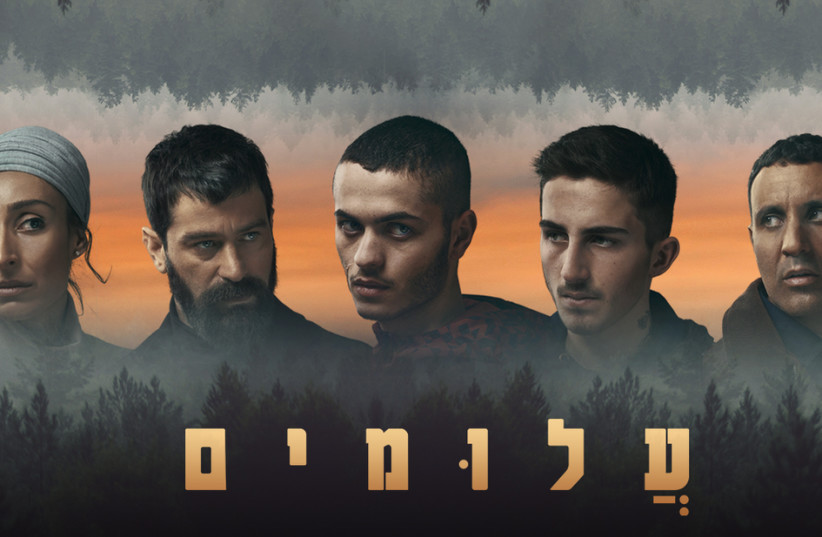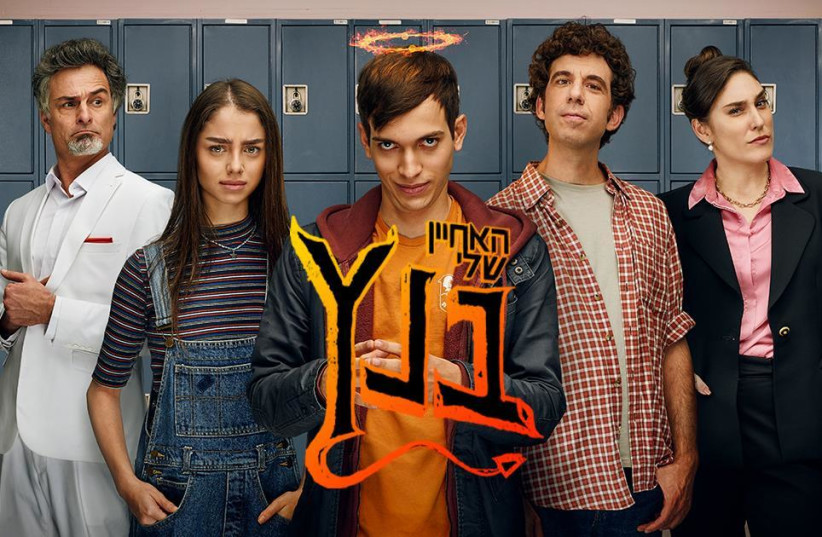The Hebrew calendar year of 5782 was an almost routine year in Israeli terms: There were no election campaigns or colossal disasters, the seasonal military operation was short, and even the global pandemic receded. And with that, objectively speaking, we had fewer reasons to be glued to television screens this year.
And what was actually waiting for us there most of the time? Not exciting things, but more generic, tiresomely ongoing seasons of reality shows, more failed current affairs programs, and one dystopian coverage of an attack in the middle of Tel Aviv. Nothing really to write home about.
In between all of this, there were also Israeli-made programs. However, in relation to the exemplary year of 5781 which gave birth to programs such as Rehearsals, The Commander, and surprising hits like Bnei Or, 5782 was not a glorious year for Israeli TV. Old series disappointed, new series struggled to capture hearts, and the majority simply passed under the radar without leaving a mark. And yet, some exceptional things were nevertheless discovered.
The ten series we have chosen have some common themes: Four of them are thrillers. Four more are musical series, and hasidic dramas and youth comedies complete the line-up. Most of them deal with tensions between parents and childen, and in about half of them, the plot concerns a police investigation. Yehuda Levy stars in two of them, Maor Cohen in two others, and Nurit Gefen appears in another two.
But this information is trivial: above all, all ten series were interesting enough in our eyes to debate them, devote ourselves to them, offer up interpretations and wonder what they say about Israeli society.

So here they are: the ten greatest Israeli series of 5782, in our opinion.
10. <em>Tehran</em> (Kan 11)
It is unclear how the secret war between Israel and Iran will develop, but in the world of Tehran, the immersive Israeli thriller starring Niv Sultan, it is close to reaching a boiling point. The second season of this game of identities and loyalties converged into a brash and extreme finale that reshuffled the cards: the big players - the states - will also enter a new game, and the small players, those who survived the dramatic chain of events, can no longer trust anyone.
The second season, and especially its finale, actually crushed most of the cornerstones of the plot until then. A resounding finale befitting the entire season, in which the action and tension of Tehran reached as far as possible. It didn't leave a moment to breathe, presenting great chases and outstanding cat-and-mouse games. Glenn Close and Shawn Taub exuded charisma, and the high production values and the large amount of money poured in this season proved itself. Tehran became an effective and refined piece of television candy, even if it was a little superficial.
9. <em>Shanot Hayereah</em> (Hot)
Many things can be said about Aviv Gefen's autobiographical series, most of them have indeed been said, but one thing cannot be taken away from it: it was the most talked about series this year. On social media, laugh-out-loud posts on Facebook analyzed its failures at length, and the buzz around the show was the biggest seen in years for any Hot original series. Indeed, Shanot Hayereah (Years of the Moon) is far from perfect, but in the basic and important ways it worked.
For starters, the acting is excellent most of the time. The direction infused the series with a dimension of adventure that pushed the series forward and up. Sometimes it was a bit excessive - like the scenes of the rain falling on Aviv while he was in bed - and sometimes it was interesting, like the covers of the fictitious record pair he received as a gift from his father and the conversations they had with each other on the shelf in his room.
The self-awareness is apparent in almost every element of Shanot Hayereah and elevates it, making it seem bare enough to lend any semblance of sincerity. Gefen does not hesitate to refer to his shrill voice, to his perception as a "son of" - which on the one hand caused many to dismiss him as a pale version of his father, and on the other hand provided him with all the connections, that paved his way, and to the splintering of his parents' relationship without embellishment.
The bitterness and sobriety that is present throughout the series balances the entire show. Because at its core, regardless of Aviv Gefen's biography and the story about a musician on the verge of breaking through or a specific period in Israeli history, this is a sweet coming-of-age drama. A story about a boy who is looking for his way in the world, who tries to shed his father's weight on him (and also take advantage of it), who experiences loss, heartbreak, friendships, and intense love.
8. <em>Alumim</em> (Kan 11)
Like Bnei Or before it and The Good City after it, Alumim turns the spotlight on what is happening in Israel's backyards, the places that are easier to look away from, and at the same time points an accusing finger at those who neglect them there.
And like Bnei Or and The Good City, Alumim also places at its center, strong-willed youths from the periphery of the country, those whose future is a huge concrete wall ahead of them, and who will find it almost impossible to succeed. The drama, which focuses on a group of boys from a run-down school who struggle to break through the cycles of poverty and violence, is one that is hard to watch and hard to look away from.

The acting of all the young people in it is simply wonderful, led by Ofek Pesach who is wonderful in the role of Menachem, a complex and layered character who has nothing comforting about him; Ben Sultan, whose screen time in the role of Yanon is not very large and yet quietly expresses a lot of emotion; And Amir Tesler, who, like a light shining through slits, regularly demonstrates the soul of Usher under the armor of toughness he had to fashion for himself. Happiness alone is probably the strongest element of the series, one that covers up its many flaws, crushing the heart with its desperate desire to break free from the shackles that prevent it from soaring.
7. <em>Yeladim B'Yar</em> (Yes)
The suspense drama Yeladim B'Yar (Children in the Forest) created by Dalit Kahn, centered on the investigation of a baby trafficking network and a homeless woman's search for her brother, has been fraught with dramatic developments at a dizzying pace since its inception.
Kahn does not spare her viewers and hits them with a hammer with all her might: she presents an ugly, violent world, full of cruelty, exploitation and heart-warming psychopaths - things that we may have gotten used to seeing in detective series from cold Europe, but receive a horrifying reality in Hebrew.
The series follows all the conventions of the genre, and thus, the twists and turns of the plot - ambitious, one must say - are sometimes exaggerated, the dialogues are a bit far-fetched and the discoveries are crazy, the police are superheroes with amazing technical abilities and the bad guys are supervillains, criminal minds from hell. And as is the way with such series - if you've seen enough of them - the plot is also quite predictable. Still, Yeladim B'Yar manages to be an excellent thriller at a very high level, one of the best of its kind made in Israel. Most of all, its pace sweeps the viewers away, so it's easy to devote yourself to the show and keep your fingers crossed for the heroes in the face of hardships. Kahn, who also stars as the heroine of the series, does a lot almost without saying a word, and leads together with Yeftah Klein a cast of obsessive but touching characters.
6-5. <em>Menagen V'Shir</em> (Yes), <em>Hed Kolach</em> (Kan 11)
It's hard not to think of Hed Kolach (The Echo of your Voice) and Menagen V'Shir (Play and Sing) as sister series, and not only because they are musical series that were broadcast at the same time: in both, the fathers are absent and the protagonists act in their image; In both, they have inherited his music, and in both a share turns out to be stolen. Both of them star reality TV veterans while both despise reality TV and cover versions as a marketing strategy, and are generally very busy with the question of authenticity; Both embrace very strongly the music of previous generations, and you can go on and on and on.
Menagen V'Shir, centered on the relationship between the rising singer Gili Hadad and Yahi, the black market man who patronizes him, may not have made a lot of noise, but for most of the time, it was real candy. First of all thanks to the excellent acting of its protagonists, led by the phenomenal Bar Tzabri and Shashon Gabai in the main roles, the same is true for almost each and every one of the characters in the series, both main and secondary. No less important, the show also captivated audiences through its clever engagement in strengthening and priming family relationships.
Hed Kolach, which weaves together three generations of male musicians who are entangled among themselves, may be very sophisticated (and clever) and invites a lot of diverse readings. Still, it is also the less fluid series of the two. However, in its last episode, where all the lies are revealed, something finally connects within it, through compassion, sympathy and redemption for the characters. Above all, the really great strength of "Hed Kolach is its stunning soundtrack, and like a good musical it serves as a key to the plot - until sometimes it seems as if the series was written based on the songs and not the other way around. It is a fascinating collection of songs that stands on its own, as a concept album that ranges between the three heroes of the story. What can we say: This is easily one of the albums of the year.
4. <em>My Nephew Benz</em> (Kan Educational)
It's true that there isn't too much competition, but one of the best comedies on the screen this year was hiding in the Kan Educational channel (and then, due to its success, it also came to Kan 11.) It dealt - of all things in the world - with the attempts of Satan's son to pass his graduation from a human high school.

Still, the youth series My Nephew Benz, created by Dror Weidman, is everything you could ask for: wild, intelligent and even subversive at times, and a show that will make adults laugh too. With short episodes that are fun in spirit and somewhat silly (and there is really no need to watch them according to some kind of order) - this show speaks to the youth at eye level and dismantles the social system of the high school through the eyes of the outsiders. It adheres very closely to the rules of the genre, and at the same time serves as an excellent parody of any high school series, as well as a few other things.
Along with the talented boys in the main roles, the excellent cast also includes great comedians in guest roles, from Avi Greinik in a brilliant role as Yohai the server, who entertains almost without saying a single word, through to Sharon Teicher as the director of the rival school and to Tomer Sharon who surprises as the evil Haman. This is all well and good most of the time, but in the moments when Usherit Sarosi and Geet Fisher are in the scene, that's really when the smiles turn into uncontrollable bursts of laughter. With all these, in an age that includes a lot of dark youth dramas - My Nephew Benz is their funny and vital sister.
3. <em>Sisu V'Simhu</em> (Kan 11)
There is not even a hint of realism in this wild military comedy, which celebrates, of all the units in the world, the Military Rabbinical Choir. The base and the band within it have no intention at all of looking like an institution that functions or conducts itself logically. In fact, the most pious place that is charged with keeping Jewish law is in complete chaos, is closer to a circus. In this world, Sisu V'Simhu presents one of the most daring and blatant series seen on the Israeli screen in a long time.
Even if the quality level of the show is not quite uniform, and even though it does not touch on sensitive points sharply enough, Sisu V'Simhu compensates for this with wild, sometimes extreme humor - and not un-infantile, let's put it this way - which gives the whole series an atmosphere of an out-of-control skit, which somehow is also a musical. And indeed, it turns out that any space can be used to create a spectacle, as exaggerated as it may be on purpose. Jokes run in the purification rooms, soldiers escape circumcision, and the band continues to try not to be disgraced.
Even if the show isn't always brilliant, and it lost its focus more than once, the music in the series is lovable, the chemistry between the actors is good, and we must appreciate the general playfulness, which gave rise to some of the most extreme scenes and characters we've seen on television in recent years, including Aki Avni as a devout, disturbed and unforgettable Rabbi. The series' boldness and originality are worth dancing the blues with on the steps of the military rabbinate.
2. <em>Manayek</em> (Kan 11)
While it is true that the second season of the police drama was not as good as the first, it nevertheless finishes in second place, indicating the less successful crop of Israeli TV shows this year.
In this season, Manayek continued to establish the status of Izzy Bacher, played by Shalom Assig, as a great cultural detective - who won the hearts of Israelis because he is the face of the state: angry with all his heart, improvising, unable to remain silent in the face of corruption and cowardice even when it comes from the people closest to him.
As a general rule, even this season, despite all the stormy happenings, the keyword of Manayek is restraint, in the game, in the conduct, in the promotion of the big plan. These reach their peak with Barak Harel, who moves the players on the board with silence and an almost psychopathic composure until he reveals himself in his cruelty, in a simply wonderful performance by Amos Tamm. This restraint increases quiet strengths, in a series that has almost no catharsis, but mainly another blow and another blow to its Sisyphean heroes, who forever roll the investigation up the hill only to start the climb from the beginning with more scars and insults.
Its multifaceted and rich world, skillfully built by Roi Idan, is the one that enables the continuity of Manayek over time, but during the season the question arose as to whether it is not close to exhaustion: the game of cat and mouse is beginning to repeat itself, and in any case, there are almost no new mysteries in the series - but only a chase that goes on and on. Can the emotional battle between Izzy and Barak continue? After this almost didn't happen throughout the season, the final two episodes proved that she still has a lot to sell.
1. <em>Rikud Ha'Esh</em> (Yes)
A cloud hangs over the drama created by Rama Burstein, with accusations that the series acted as a defense letter for Eliezer Berland. It's hard to see it in the end, because fiction is far enough from reality, and above all, Rikud Ha'Esh (Fire Dance) stands on its own as an extraordinary work with a heroine who is one of the most stunning characters on television this year, and in general. A series full of strong, touching images, which sometimes make it resemble a Midrash legend or a hasidic story, one that connects the spirit to the ground.
It is often difficult to gauge the essence of the series. Sometimes along the way, it seems to take place in scenes that are not always reasoned, dialogues that are often enigmatic, and nuances that make up something that slips through fingers like mercury. It is something that as a whole may disturb and oppress, but at the same time its beauty is regularly expressed through slits. Even in scenes that might be revolting there is so much lyricism and power.
Despite this elusiveness, and perhaps because of it, there is always something magnetic about Rikud Ha'Esh. Something that is big and small at the same time, incredibly intimate and yet vast like no other. Uneasy balances that the series is amazing to maintain thanks to beautiful and attractive writing, magical direction and excellent acting.
The inexperienced Mia Ibrin impresses in the demanding main role, creating with Burstein a strong, stubborn and unique character. Alongside her, Yehuda Levy is exciting in the role of the complicated rabbi, and rightly so, he won the best actor award at the Series Mania festival for his role here. Because of all these, this is our series of the year.
